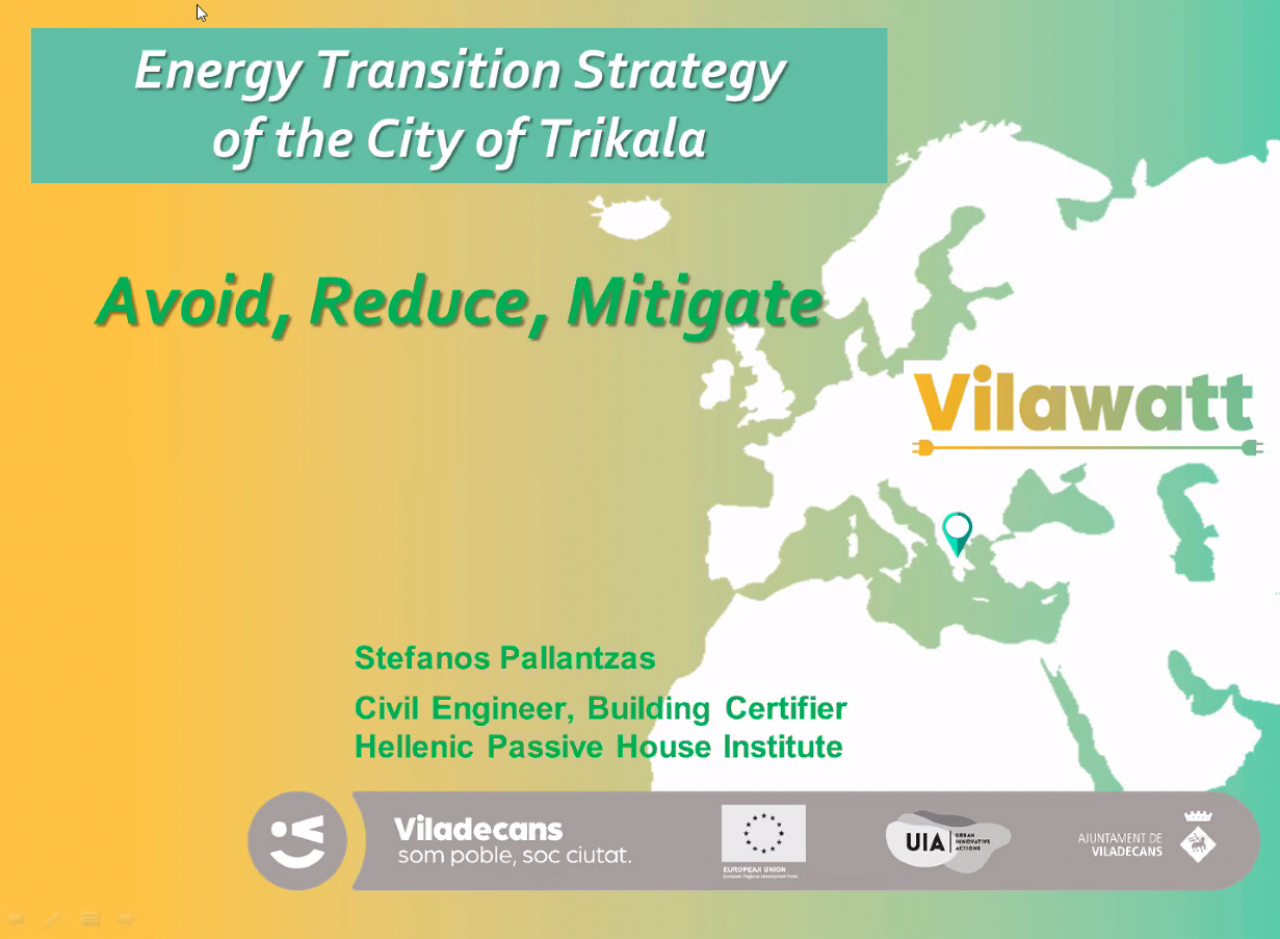
https://bit.ly/3bk5SmhThe 4th Vilawatt-UTM Transnational Meeting was held on 2 and 3 March and hosted by the city of Trikala. The two-days online sessions allowed the partner cities to make further progress in the Vilawatt project transfer.
One of the objectives of the meeting was to know about the experience of Trikala and its local or proximity projects with connections to Vilawatt. The projects presented by Trikala are related to Vilawatt in terms of energy intensive work, with two key points: innovation and citizen engagement.
After opening remarks by Vasilena Mitsiadi, Municipal Councillor of Trikala, and Maria Papoutsi, Greek-Cyprus URBACT Contact Point, Jordi Mazón, Vice Mayor for Ecological Transitions in Viladecans, highlighted the importance of working together for energy transition in the city. Stefanos Pallantzas, Trikala Project ad-hoc expert, presented the Trikala Energy Strategy 2030. The city's strategy is based on five pillars:
- Modern energy management with a focus on saving energy.
- Energy independence and innovation.
- Renewable energy production and storage.
- Zerocarbon transport.
- Sustainable city.
Trikala has a good track of technology adoption and digital solutions in pursuit of becoming a "smart city" and has performed highly in terms of innovation results. The Greek Ministry of Economy named Trikala the nation's first digital city in 2004 and it has also just been announced as one of two 5G pilot cities in Greece. The Municipality is integrating e-governance solutions as well as co-creation and social innovation procedures to maximise multi-stakeholder and vulnerable group participation in municipal decision-making processes.
In addition, Trikala has applied, like Viladecans, to the Climate-Neutral & Smart Cities Mission. Konstantina Zachari, Advisor to the Mayor of Trikala, explained the basic guidelines of the candidacy, created through a system of co-creation involving the participation of schools, citizens and other stakeholders.
Kostas Karamarkos, Coordinator of Trikala’s local group of stakeholders, explained how Vilawatt priority transfer pillars are being worked on in Trikala, based on:
- Energy consumption possibilities
- Learning communities
- Municipal and public buildings retrofitting
- Local approach to aggregated energy supply
Gregory Gordon, URBACT DigiPlace project team member for e-Trikala, explained the most important digital challenges facing the city and how they can be used to optimise energy consumption and energy production.
Dr. Vasilis Nikolopoulos from Protergia-Mytilineos Group analysed the future of energy production in Greece, highlighting that prosumers (consumers and producers of energy) will be key drivers in the energy transition.
Dr. Dimitris Stimoniaris from the University of Western Macedonia explained the contribution of the SEM-LAB to the smart management and promotion of energy efficiency of buildings in relation to retrofitting.
In Trikala, another strong focus towards energy efficiency is sustainable mobility through electric vehicles. Dr. Evangelina Portouli, researcher at the Institute of Communication and Computer System, shared some key ideas to convince and motivate people to use these electric mobility systems. Similarly, Artemis Giavasoglou, architect and director of the SPARCs project, explained how to stimulate the participation of citizens in sustainability projects with some concrete examples.
Finally, the former mayor of the Greek city of Kozani, Ioannidis Lefteris, introduced us to the energy communities in Western Macedonia, and stressed the important role of public institutions in promoting them.
The second day of the meeting was dedicated to working on the Investment Plans (Springboard Plan in the case of Viladecans) and on updating the Scorecard. There was also time to talk about funding. The expert Paul Fenton presented some of the funding possibilities offered by the European Union that can connect the interests of the partner cities in relation to Vilawatt.
Find out more here
